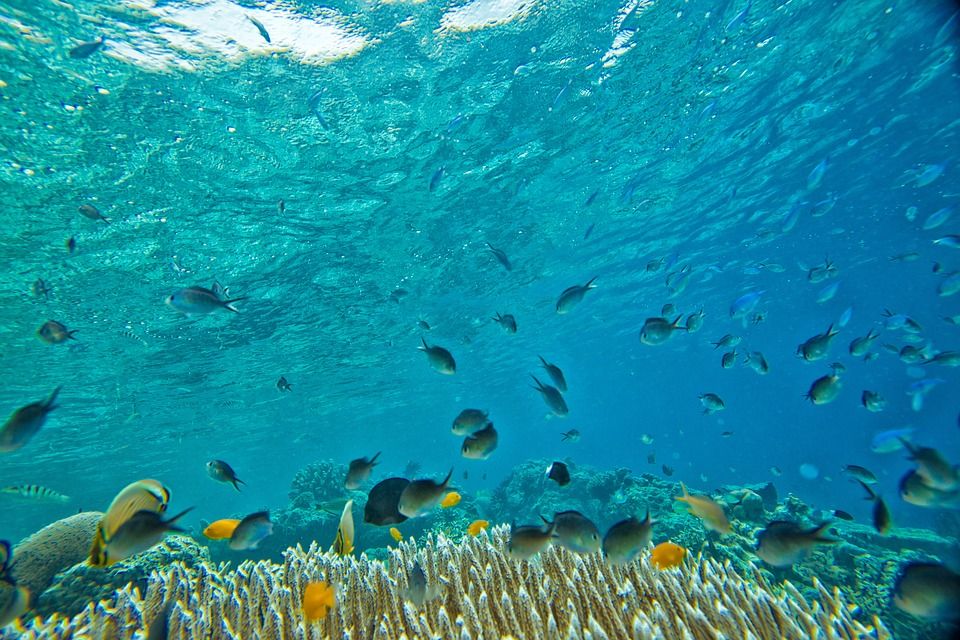Blue Planet II Live depicted the relevance and beauty of all living things
A huge blue planet, wrapped in wisps of cloud and steadily revolving lit up the 200 square meters 4K Ultra HD LED superscreen to welcome crowds into the Genting Arena last Saturday night. The space took on a marine glow through which people waded to their seats, snapping a few awkward selfies along the way.
The arrival of the City of Prague Orchestra to the stage stirred great excitement. Conductor Matthew Freeman arrived last, taking a friendly bow and launching straight into the signature theme. The screen erupted into action with a montage of clips, gigantic curling waves and leaping dolphins galore. Shivers all around.
Dumbstruck immersion didn’t last for long, however, as the BBC presenter Anita Rani, quickly made her way onto the stage. Sporting a long black dress, Rani evoked more connotations to the Oscars than any rugged, khaki style of a Steve Backshall. Cracking jokes and demanding interaction from the crowd, it quickly became apparent that the evening would be choppier than expected, with slightly tenuous One Show-style introductions to most scenes and a script that sounded as though it had been written by King Henry VIII. At one point, the Bobbit worm was referred to as “terrible and beautiful, like most women”. Moving carefully past this, though, there were some good nuggets of information, like the fact that twelve people have stepped on the moon, yet only three have been to the depths of the ocean.
The production was impeccable throughout
This feature of the evening, however, clearly remained prevalent in the minds of many throughout, who appeared to grumble and shift uncomfortably every five or so minutes. This was the case especially when the host could be seen in the wings preparing to trot up the steps to take centre stage again, ripping the audience away from the musicians’ carefully crafted immersion. Despite this, the flow improved after the interval, when segments tended to run for longer without interruption, allowing for a better sense of focus and escapism.
Appearances from the most characterful creatures were enhanced greatly by the playfulness in Zimmer’s score. A clownfish family working together to bring a beloved coconut shell back to their four-bed detached coral was both uplifting and adorable to see and to hear. Likewise, a handsome Puffin’s precarious trip to find food for its partner was tinged with all the swooping highs and lows of romance and danger. Swashbuckling plucked strings accompanied the neon-blue bulge of a Portuguese man catching the ocean breeze in its little jelly Mohican and sailing towards a gloopy orange sunset.
Lighting effects and good old fashioned smoke machines were used sparingly but to great effect. At one point, when the orcas and whales teamed up to hunt huge shimmering shoals of fish on the screen, dappled lighting extended out above the audience giving the effect of an even greater shoal in the peripheral vision. During a segment focusing on aliens of the deep sea, dark smoke billowed around the screen drawing the focus inwards to the sci-fi world of sunken lakes and dipping snakes, see-through brain fish and underwater eruptions. In all, the production was impeccable throughout, aside from the low volume levels, which at times felt like they needed a boost to fully galvanize the audience into the immersion of a live setting.
The concert as a whole acted as a reminder of the incredible amount of work behind Blue Planet II
Regardless, the City of Prague Orchestra delivered a first-class performance, conjuring up swirling symphonies of sound that plunged the audience into the deepest depths of the ocean, only to be torpedoed by what must be assumed as being the heavy-handed approach of the BBC. In future, it would be best to allow the art to speak for itself. It is not hard to judge that those attending expected all the immersion and wonderment of a blockbuster movie score in the flesh – they were not paying for the patronizing simplicity of a One Show segment.
Still, the concert as a whole acted as a reminder of the incredible amount of work behind Blue Planet II. The care shown allowed a depiction of the relevance and beauty of all living things. David Attenborough’s environmental plea was played towards the end of the show, urging viewers to act and to think about the future of our planet. A powerful reminder that the planet is shared, as the art of music exists to be shared.

Comments